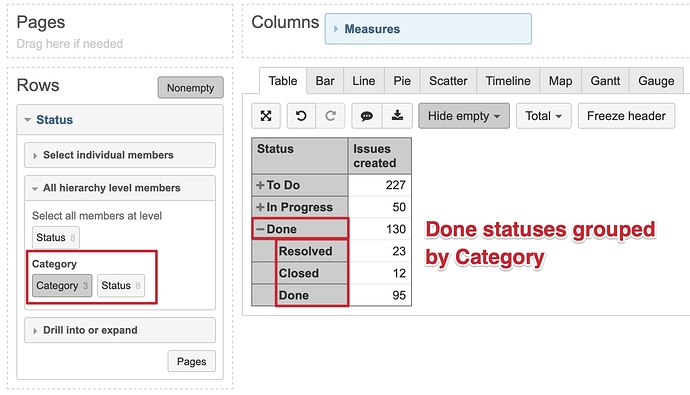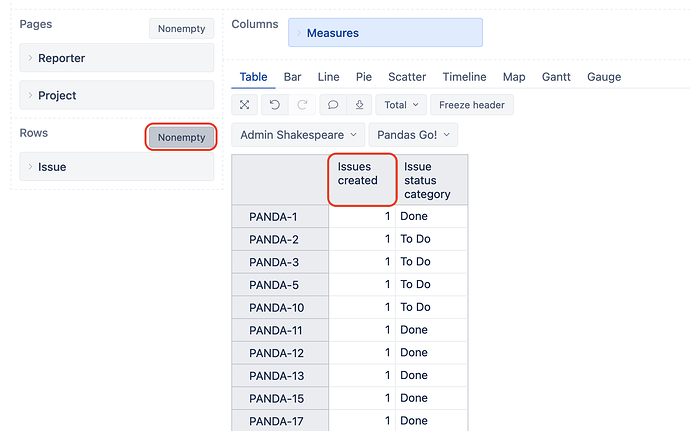Hi I have the non Empty set, and I still get other issue types (Bugs, Stories).
This is the Screen Shot:
And this is the report definition (Simplified Version):
{
“cube_name”: “Issues”,
“cube_reports”: [ {
“name”: “ER list (CS) OLD”,
“result_view”: “table”,
“definition”: {“columns”:{“dimensions”:[{“name”:“Measures”,“selected_set”:[“[Measures].[Status ]”,“[Measures].[Issue type]”,“[Measures].[Status-Category]”,“[Measures].[Issues created]”],“members”:[]}]},“rows”:{“dimensions”:[{“name”:“Issue”,“selected_set”:[“[Issue].[Issue].Members”],“members”:[],“bookmarked_members”:[]}],“order_by”:{“expression”:[“[Measures].[Issue type]”],“order”:“ASC”},“nonempty_crossjoin”:true},“pages”:{“dimensions”:[{“name”:“Issue Type”,“selected_set”:[“[Issue Type].[BRNGG R\u0026D Types]”,“[Issue Type].[All Issue Types]”],“members”:[{“depth”:0,“name”:“BRNGG R\u0026D Types”,“full_name”:“[Issue Type].[BRNGG R\u0026D Types]”,“calculated”:true,“drillable”:true,“expanded”:true,“removed”:true},{“depth”:1,“name”:“Task”,“full_name”:“[Issue Type].[Task]”,“parent_full_name”:“[Issue Type].[BRNGG R\u0026D Types]”}],“bookmarked_members”:[],“current_page_members”:[“[Issue Type].[Task]”]}],“nonempty_crossjoin”:true},“options”:{},“view”:{“current”:“table”,“maximized”:false,“table”:{“row_dimension_headers”:{“Issue”:“TASK”},“cell_formatting”:{},“freeze_header”:true}},“calculated_members”:[{“dimension”:“Measures”,“name”:“ER Status”,“formula”:“CASE WHEN (IsEmpty([Measures].[Related Issue type]))\nTHEN\n[Status].[Status].getMemberNameByKey(\n[Issue].[Issue].GetMemberByKey([Measures].[ER KEY]).get(‘Status ID’)\n)\nEND”,“format_string”:“StringFormatter”},{“dimension”:“Measures”,“name”:“ER Fix Version”,“formula”:“CASE WHEN (IsEmpty([Measures].[Related Issue type]))\nTHEN\n[Fix Version].[Version].getMemberNamesByKeys(\n [Issue].[Issue].GetMemberByKey([Measures].[ER KEY]).\n Get(‘Fix version IDs’), ’ ')\nEND”,“format_string”:“StringFormatter”},{“dimension”:“Measures”,“name”:“ER Customer Due Date”,“formula”:“CASE WHEN (IsEmpty([Measures].[Related Issue type]))\nTHEN\n[Issue].[Issue].GetMemberByKey([Measures].[ER KEY]).get(‘Customer Due Date’)\nEND”,“format_string”:“yyyy-mm-dd”},{“dimension”:“Measures”,“name”:“ER KEY”,“formula”:“[ERs-Related issues].CurrentMember.Name\n”,“format_string”:“MarkdownFormatter”},{“dimension”:“Measures”,“name”:“ER Old Status”,“formula”:“[Status].[Status].getMemberNameByKey(\n[Issue].[Issue].GetMemberByKey(\n[Issue].CurrentHierarchyMember.get(‘ER-IO Related issues’)).get(‘Status ID’)\n)\n”,“format_string”:“”},{“dimension”:“Measures”,“name”:“ER Link (Related)”,“formula”:“CASE WHEN (IsEmpty([Measures].[Related Issue type]))\nTHEN\n"["\n||Cast([Measures].[ER KEY] as string)\n||"]"\n||"(https://bringg.atlassian.net/browse/\”\n||Cast([Measures].[ER KEY] as string)\n||")"\nEND",“format_string”:“MarkdownFormatter”},{“dimension”:“Measures”,“name”:“Related Issue Estimate”,“formula”:“[Issue].CurrentHierarchyMember.get(‘High-level Estimation’)”,“format_string”:“”},{“dimension”:“Measures”,“name”:“ER Link”,“formula”:“[Measures].[Issue Hyper Link]”,“format_string”:“MarkdownFormatter”},{“dimension”:“Measures”,“name”:“ER Product Domain”,“formula”:“CASE WHEN (IsEmpty([Measures].[Related Issue type]))\nTHEN\n[Issue].[Issue].GetMemberByKey([Measures].[ER KEY]).get(‘Product Domain’)\nEND”,“format_string”:“”},{“dimension”:“Measures”,“name”:“Planned due date”,“formula”:“[Measures].[Issue due date]”,“format_string”:“”},{“dimension”:“Measures”,“name”:“Date 2”,“formula”:“[Measures].[Issue Target Release Date]”,“format_string”:“”}],“description”:“Presents ER list and its status”}
} ],
“calculated_members”: [{“dimension”:“Measures”,“name”:“Issue due date”,“format_string”:“mmm dd yyyy”,“formula”:“[Issue].CurrentHierarchyMember.get(‘Due date’)”},{“dimension”:“Measures”,“name”:“Issue type”,“format_string”:“”,“formula”:“[Issue Type].[Issue Type].getMemberNameByKey(\n [Issue].CurrentHierarchyMember.get(‘Issue type ID’)\n)”},{“dimension”:“Measures”,“name”:“Issue status”,“format_string”:“”,“formula”:“[Status].[Status].getMemberNameByKey(\n [Issue].CurrentHierarchyMember.get(‘Status ID’)\n)”},{“name”:“Issue Target Release Date”,“dimension”:“Measures”,“formula”:“[Issue].CurrentHierarchyMember.get(‘Target Release Date’)”,“format_string”:“mmm dd yyyy”},{“name”:“BRNGG R\u0026D Types”,“dimension”:“Issue Type”,“formula”:“Aggregate({\n [Issue Type].[Customer Bug],\n [Issue Type].[Enhancement Request],\n [Issue Type].[Story],\n [Issue Type].[Task],\n [Issue Type].[Bug],\n [Issue Type].[System Test]\n\n})”,“format_string”:“”},{“name”:“Related Issue Status”,“dimension”:“Measures”,“formula”:“[Status].[Status].getMemberNameByKey(\n [Issue].CurrentHierarchyMember.get(‘Status ID’)\n)”,“format_string”:“”},{“name”:“Related Issue type”,“dimension”:“Measures”,“formula”:“[Issue Type].[Issue Type].getMemberNameByKey(\n [Issue].CurrentHierarchyMember.get(‘Issue type ID’)\n)”,“format_string”:“”},{“name”:“Issue Hyper Link”,“dimension”:“Measures”,“formula”:“CASE WHEN (NOT IsEmpty([Measures].[Related Issue type]))\nTHEN\n"["\n||Cast([Issue].CurrentHierarchyMember.Key as string)\n||"]"\n||"(https://bringg.atlassian.net/browse/\”\n||Cast([Issue].CurrentHierarchyMember.Key as string)\n||")"\nEND\n",“format_string”:“MarkdownFormatter”},{“name”:"Status ",“dimension”:“Measures”,“formula”:“CASE WHEN [Measures].[Status-Category] = "To Do"\n Then "\u003cspan style=‘color:Black’\u003e" || [Measures].[Issue status] || "\u003c/span\u003e"\n WHEN [Measures].[Status-Category] = "In Progress"\n Then "\u003cspan style=‘color:Blue’\u003e" || [Measures].[Issue status] || "\u003c/span\u003e"\n WHEN [Measures].[Status-Category] = "Done"\n Then "\u003cspan style=‘color:Green;font-weight:bold’\u003e" || [Measures].[Issue status] || "\u003c/span\u003e"\n ELSE\n [Measures].[Issue status]\nEND\n “,“format_string”:“HTMLFormatter”},{“name”:“Status-Category”,“dimension”:“Measures”,“formula”:”[Status.Category].[Status].getMemberByKey(\n [Issue].CurrentHierarchyMember.get(‘Status ID’)\n–for that status, get the parent (category) name\n).Parent.Name”,“format_string”:“StringFormatter”}]
}



